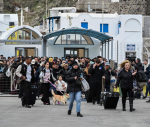You are here
For the region, climate change is the ultimate enemy
Aug 10,2021 - Last updated at Aug 10,2021
For decades scientists have been warning governments about the catastrophic effects of global warming, caused by greenhouse gas emissions, on climate change and calling for drastic measures to reduce man-made CO2 emissions as the only way to prevent world-wide environmental disaster. But since the signing of the Kyoto Protocol in 1997, only 55 countries have ratified it out of 84 original signatories. Between then and now, with little done by major gas emission countries, scientists are finding that their original projections had missed their targets and now we could well be heading towards steep climate change effects sooner with more disastrous ramifications than expected.
Last week, a draft report by the UN’s Intergovernmental Panel on Climate Change (IPCC), warned that warming across the Mediterranean will be about 20 per cent higher than global averages in the decades to come as the region is hit by devastating heatwaves, water shortages, loss of biodiversity and risks to food production. The release of these initial findings coincided with the worst forest fires, mainly due to record breaking high temperatures, that raged through vast wooded regions of Turkey, Greece, Cyprus and Lebanon in the past few weeks.
In contrast, unseasonal floods, due to torrential summer rains, hit vast areas of Algeria resulting in landslides and casualties. Yemen too saw floods and vast damage to property while Iranians took to the streets in southwest Iran to protest endemic water shortages due to years of drought. Iraq’s Tigris and Euphrates rivers are seeing historic low levels of water, partly due to drought but also because Turkey and Iran are controlling the flow of water through dams. Poor rainy seasons have caused droughts in Syria and Jordan resulting in acute drinking water shortages.
These climate change events are not restricted to the Middle East and North Africa regions but have been documented all over the globe; from uncontrollable wildfires in North America, to devastating floods in Germany, Belgium, India and China. Record high temperatures have been recorded in the US, Turkey, Iran, Greenland and Siberia, among others.
But now we know that our region will be particularly affected by a faster than expected climate change fluctuations. The Middle East, North Africa and the Gulf will be particularly hit by rising sea levels, drought, scorching heat waves beyond what humans can endure with severe socioeconomic outcome. One study predicts that extreme temperatures currently recorded once in every 20 summer days will soon become a new norm. It adds that “major cities such as Doha, Abu Dhabi, Dubai and Bandar Abbas”, could be hitting the wet-bulb temperature “several times over a 30-year period” by the end of the century if the carbon (CO2) emissions do not decrease.
Earlier this week, António Guterres, the UN secretary general, warned: “[The IPCC report] is a code red for humanity. The alarm bells are deafening, and the evidence is irrefutable: greenhouse gas emissions from fossil fuel burning and deforestation are choking our planet and putting billions of people at immediate risk.”
The revelations come less than three months before a crucial meeting on climate change takes place in Glasgow, Scotland, under the COP26, which will follow up on the resolutions of the 2015 Paris Climate Change conference. It now seems that countries will fail to limit temperature rise to 1.5°C above pre-industrial levels, and that 2°C and even 3°C temperature rise can be expected within a few years and decades.
To put things into perspective, the World Meteorological Organisation (WMO) latest data shows that our planet is 1.1-1.3°C warmer than it was before the steam engine was invented. The WMO also cited that on July 19 more than 40 per cent of the Greenland ice cap had melt water on it.
Much closer to home a study by Nature Climate Change (nature.com) published in October 2015 concluded that for the GCC region, climate change implications will impact various fields, including environmental, economic, political and even security. The Arabian Peninsula is characterised by great variability in seasonal and annual precipitation, as well as extreme temperatures, the study added. It said regional average temperature increases of 1.8°C by 2040 and 3.6°C by 2070 combined with decreasing precipitation exacerbate the already high levels of desertification in the region, further reducing the availability of arable land and water resources and leading to a higher incidence of drought.
This unprecedented existential threat needs global response and there is not time to waste. But regional governments must make their voice heard and presence felt as the Middle East, North Africa and the Gulf stand to be the worst affected by climate change. Regional political turmoil is a major impediment to collective action and this makes things even more dangerous as climate change will affect all. The threat of climate change to sustainability has never been greater and world governments can no longer ignore this problem or defer solutions to hasten adoption of green energy technologies.
Osama Al Sharif is a journalist and political commentator based in Amman













